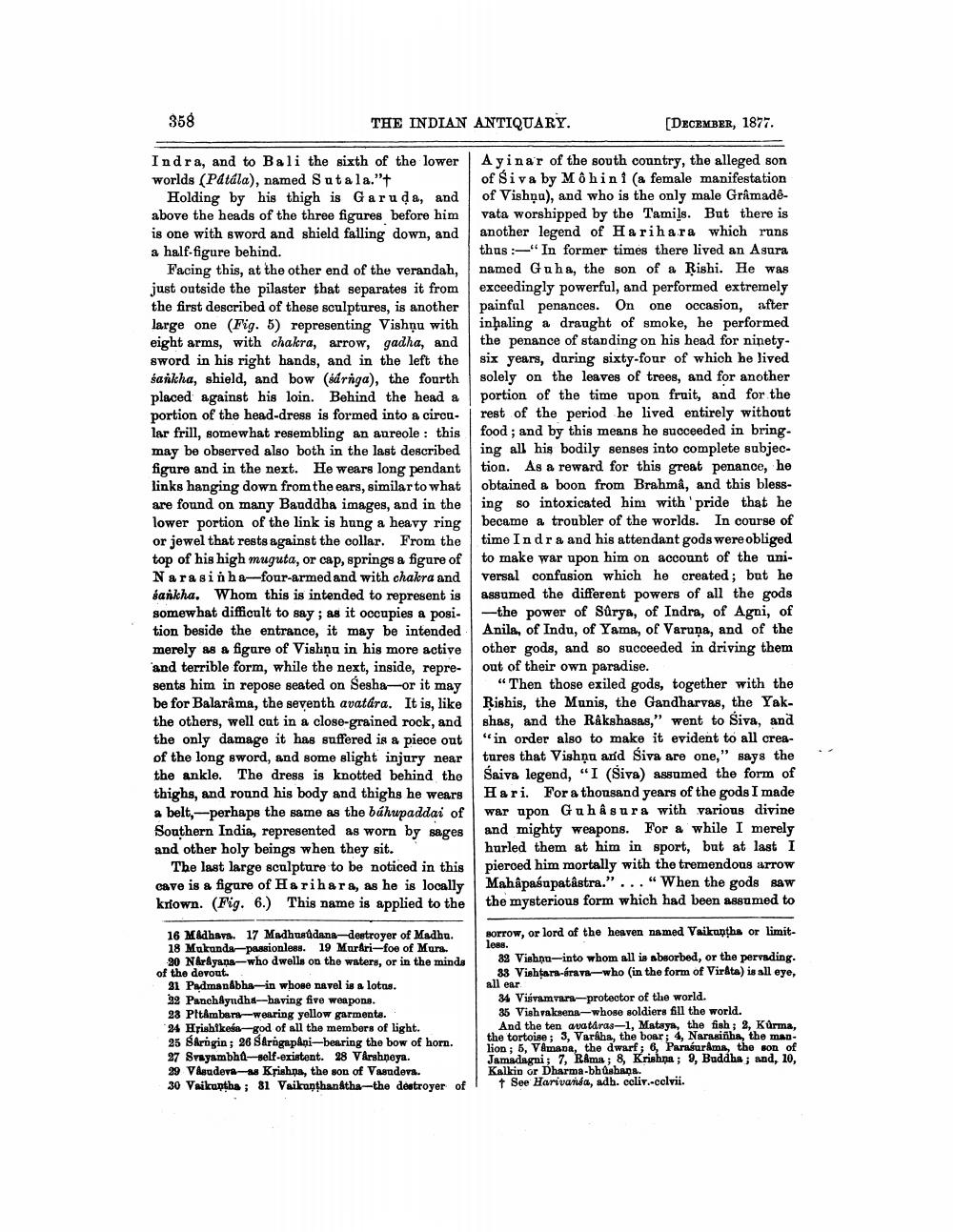________________
358
Indra, and to Bali the sixth of the lower worlds (Pátála), named Sutala."+
Holding by his thigh is Garuda, and above the heads of the three figures before him is one with sword and shield falling down, and a half-figure behind.
Facing this, at the other end of the verandah, just outside the pilaster that separates it from the first described of these sculptures, is another large one (Fig. 5) representing Vishnu with eight arms, with chakra, arrow, gadha, and sword in his right hands, and in the left the sankha, shield, and bow (sárnga), the fourth placed against his loin. Behind the head a portion of the head-dress is formed into a circular frill, somewhat resembling an aureole: this may be observed also both in the last described figure and in the next. He wears long pendant links hanging down from the ears, similar to what are found on many Bauddha images, and in the lower portion of the link is hung a heavy ring or jewel that rests against the collar. From the top of his high muguta, or cap, springs a figure of Narasinha-four-armed and with chakra and sankha. Whom this is intended to represent is somewhat difficult to say; as it occupies a position beside the entrance, it may be intended merely as a figure of Vishnu in his more active and terrible form, while the next, inside, represents him in repose seated on Sesha-or it may be for Balarama, the seventh avatára. It is, like the others, well cut in a close-grained rock, and the only damage it has suffered is a piece out of the long sword, and some slight injury near the ankle. The dress is knotted behind the thighs, and round his body and thighs he wears a belt, perhaps the same as the búhupaddai of Southern India, represented as worn by sages and other holy beings when they sit.
The last large sculpture to be noticed in this cave is a figure of Harihara, as he is locally krown. (Fig. 6.) This name is applied to the
THE INDIAN ANTIQUARY.
16 Madhava. 17 Madhusudana-destroyer of Madhu. 18 Mukunda-passionless. 19 Murári-foe of Mura. 20 Narayana-who dwells on the waters, or in the minds of the devout.
31 Padmanabha-in whose navel is a lotus.
22 Panchayudha-having five weapons.
28 Pitambara-wearing yellow garments.
[DECEMBER, 1877.
Ayinar of the south country, the alleged son of Siva by Môhini (a female manifestation of Vishnu), and who is the only male Grâmadêvata worshipped by the Tamils. But there is another legend of Harihara which runs thus:"In former times there lived an Asura named Guha, the son of a Rishi. He was exceedingly powerful, and performed extremely painful penances. On one occasion, after inhaling a draught of smoke, he performed the penance of standing on his head for ninetysix years, during sixty-four of which he lived solely on the leaves of trees, and for another portion of the time upon fruit, and for the rest of the period he lived entirely without food; and by this means he succeeded in bringing all his bodily senses into complete subjection. As a reward for this great penance, he obtained a boon from Brahmâ, and this blessing so intoxicated him with pride that he became a troubler of the worlds. In course of time Indra and his attendant gods were obliged to make war upon him on account of the universal confusion which he created; but he assumed the different powers of all the gods -the power of Sûrya, of Indra, of Agni, of Anila, of Indu, of Yama, of Varuna, and of the other gods, and so succeeded in driving them out of their own paradise.
24 Hrishikesa-god of all the members of light.
25 Sarigin; 26 Sarigapani-bearing the bow of horn.
27 Svayambhu-self-existent. 28 Varshneya.
29 Vasudeva-as Krishna, the son of Vasudeva.
30 Vaikuntha; 81 Vaikunthanatha-the destroyer of
"Then those exiled gods, together with the Rishis, the Munis, the Gandharvas, the Yakshas, and the Rakshasas," went to Siva, and "in order also to make it evident to all crea
tures that Vishnu and Siva are one," says the Saiva legend, "I (Šiva) assumed the form of Hari. For a thousand years of the gods I made war upon Guhasura with various divine and mighty weapons. For a while I merely hurled them at him in sport, but at last I pierced him mortally with the tremendous arrow Mahâpasupatâstra."... "When the gods saw the mysterious form which had been assumed to
sorrow, or lord of the heaven named Vaikuntha or limitless. 32 Vishnu-into whom all is absorbed, or the pervading. 33 Vishtara-árava-who (in the form of Virâta) is all eye, all ear
34 Visvamvara-protector of the world.
35 Vishvakeena-whose soldiers fill the world.
And the ten avataras-1, Matsya, the fish; 2, Kûrma, the tortoise; 3, Varaha, the boar; 4, Narasiñha, the manlion; 5, Vimana, the dwarf; 6, Parasurama, the son of Jamadagni; 7, Rama; 8, Krishna; 9, Buddha; and, 10, Kalkin or Dharma-bhushana.
† See Harivansa, adh. coliv.-cclvii.




